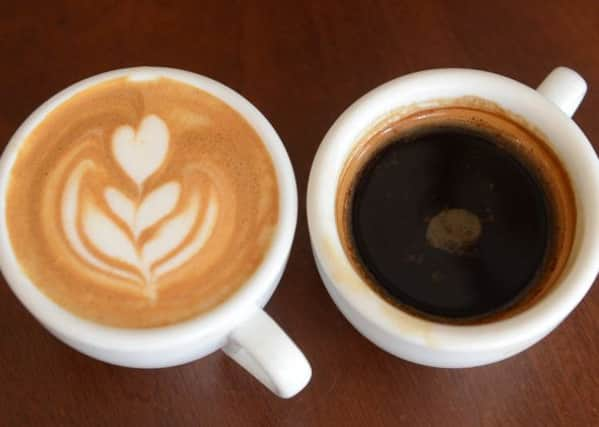UK is becoming ‘a nation coffee connoisseurs’


But we’re not talking about a beverage quaffed from a glass, bottle or can, as Scottish research shows Britons are fast becoming a nation of coffee connoisseurs.
A survey carried out by scientists at the University of Stirling has found we are increasingly obsessed with drinking the brew once dubbed “the bitter invention of Satan”.
Advertisement
Hide AdAdvertisement
Hide AdThe new study shows the UK is moving towards a more European way of socialising, with more than 40 per cent of people eschewing an after-work pub stop with colleagues in favour of a chat over coffee.
Just as wine buffs will compare a merlot with a pinot noir grape, lovers of the black stuff are doing the same with arabica and robusta beans. They also want to know if the brew is made by decoction, drip filtration, infusion, steeping or pressurised percolation.
The researchers found coffee- tasting developing as a pastime in a similar way as wine-tasting, with people keen to sample different cafes as they would vineyards.
The study, commissioned by bakers Greggs, also found coffee expertise can be a great boon when it comes to chat-up lines.
Young men questioned for the poll considered knowledge of the drink to be a very positive attribute when wooing.
“Coffee has become an identity statement, acting as a social glue that binds different groups together,” according to Professor Julie Tinson of the university.
“And just like our European cousins, who are known to spend hours in cafes or coffee shops watching the world go by, it seems catching up with friends or colleagues over a coffee is becoming as popular as heading to a pub or bar for a glass of wine or a pint.”
One in seven respondents said they simply can’t start the day without one, needing it to help them wake up. A third use it to get a boost later in the day, while one in seven says the coffee run is a great excuse to get out of the workplace.
Advertisement
Hide AdAdvertisement
Hide AdArtisan coffee roaster Hans-Erik Kleive, who launched his North Berwick firm Steampunk in 2008, termed the growth in Scotland’s coffee scene “explosive”.
The Norwegian said today’s customers have moved on from the mass-produced cappuccinos and lattes of the big chains and want a more hand-crafted approach as traditional preparation methods such as immersion techniques undergo a revival.
And consumers increasingly want coffee with a conscience, with sustainably sourced beans, short supply chains and farmers paid a fair wage. “I want the passion without the pretence, so we don’t alienate people with talking too much about what we do,” said Mr Kleive. “It is about making people interested and passing on the passion as well.”
Scottish customers veer toward coffees that are “slightly earthier and heavier – not the super-fruity ones”, he said, with top sellers from as far afield as Congo and Peru.
The firm creates around ten different roasts in machines resembling “super-heated tumble driers” and runs a fleet of customised VW camper vans as mobile cafes.
Mr Kleive added: “We’ve had requests for kopi luwak – coffee made from a bean eaten by civets in Indonesia. It’s quite controversial as the coffee beans have passed through these cat-like creatures, and sometimes they have been force-fed.
“To be honest, I’m not too keen on drinking something that has already been though another digestive system.”
Other artisan coffee firms, include Brew Lab of Edinburgh, run by Dave Law and Tom Hyde.
Advertisement
Hide AdAdvertisement
Hide AdThe Arabs were the first to cultivate coffee, growing beans in Yemen by the 15th century. Today the crop, one of the world’s most profitable, is grown throughout the world.
But whether the beans come from Asia or Africa, Central or South America, the islands of the Caribbean or the Pacific, all can trace their heritage back to ancient coffee forests on the Ethiopian plateau.